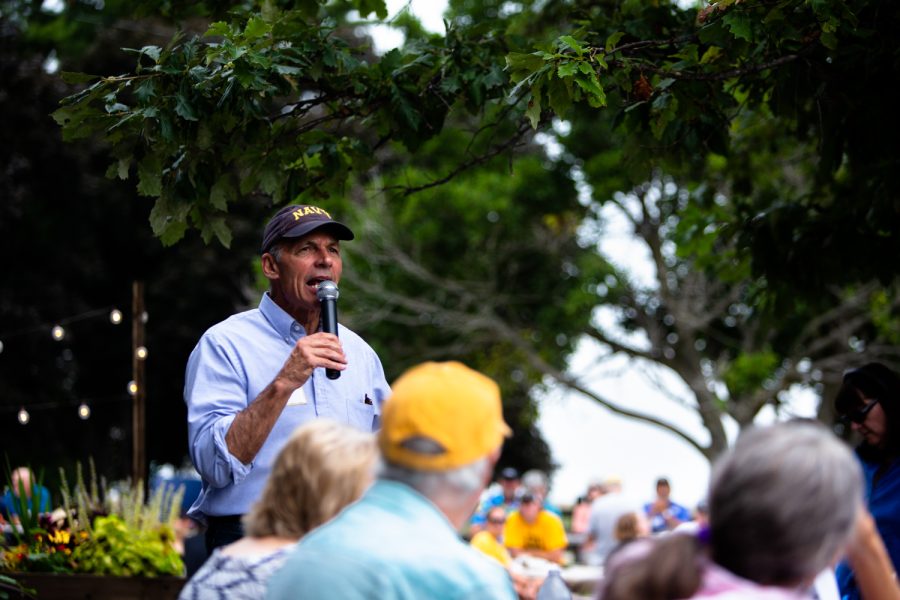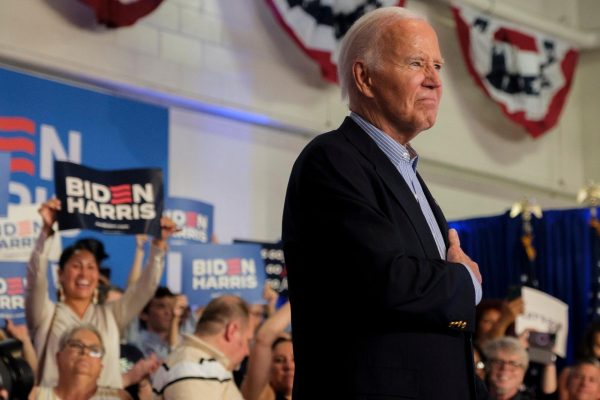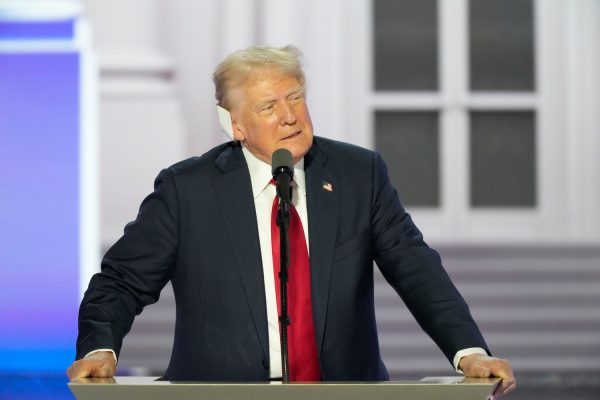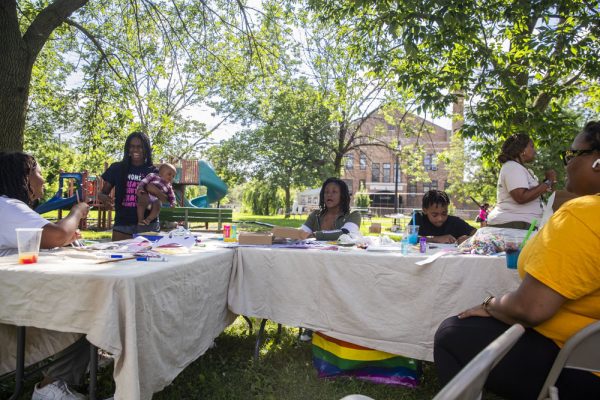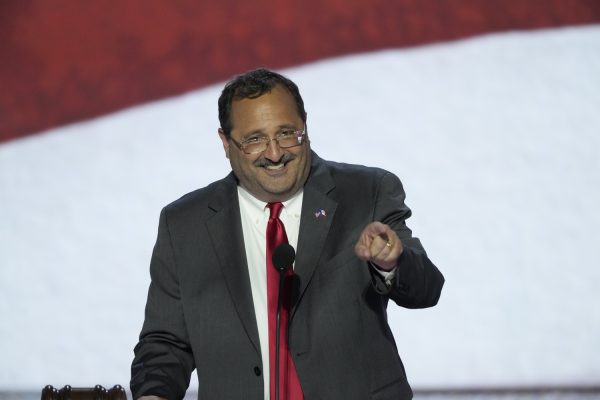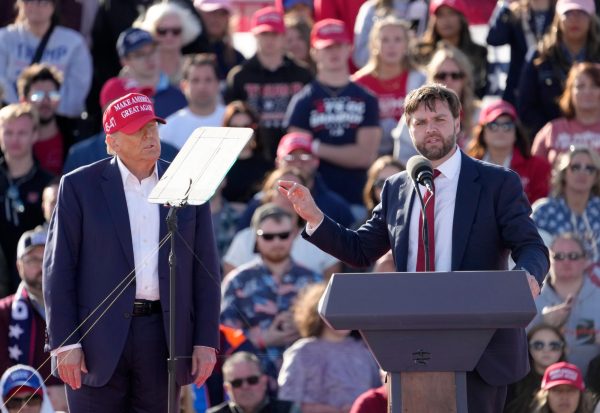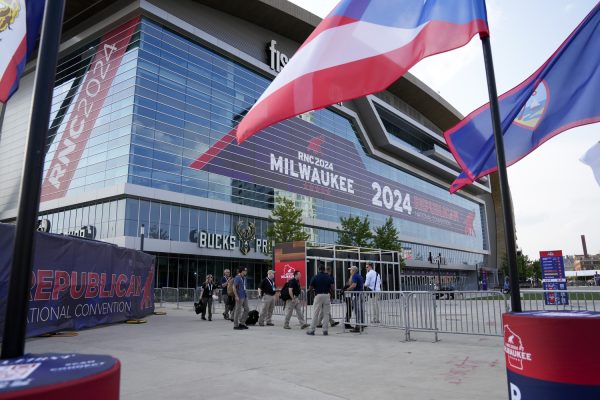Elected officials more divided than constituents, effects legislative priorities
Many candidates will reel in their views on policy and replace it with a centrist view during their campaign season, but divisive topics are still debated when they’re elected. Experts explain that this is because of the political shift in the population.
Democratic candidate for the U.S. Senate and retired U.S. Navy vice admiral Mike Franken speaks at a campaign event for democratic candidates Liz Mathis and Christina Bohannan at the Sutliff Farm & Cider House in Lisbon, Iowa.
October 26, 2022
Many candidates during the campaign season — specifically those in Iowa — have run on a platform of bipartisanship and reaching across the aisle. While bipartisanship is in effect on many issues, such as tax and business policies in Congress and state legislatures, some major issues are starkly divided by party — a division that can hinder policymaking.
Democratic candidate for the U.S. Senate Admiral Mike Franken, who faces Republican Sen. Chuck Grassley in the election, touted in a tweet how he was endorsed by long-time Republican Jim Leech.
“He served with my opponent for three decades. Now, he’s joined our team because country matters more than party,” Franken said in a tweet.
Democratic Sen. Kevin Kinney, a candidate up for re-election in Iowa Senate District 46, highlights how he is a Democrat for the right and the left and shares his Republican endorsements online.
In a time where women’s rights and reproductive rights are being debated hand-in-hand, Republican Rep. Ashley Hinson says she is the “women’s candidate” in her own fight for women’s rights, while also being anti-abortion. In a direct opposition to abortion, Hinson said in a press release that she wants to empower women to choose life.
According to Politico, affluent, suburban, white women stand in the way of Republicans’ chance to flip the Senate. To win them over, Republican nominees softened their views on abortion.
“College students who are pregnant or may become unexpectedly pregnant deserve to know all of the resources available to them, and it is unacceptable that so many are told that abortion is their only option,” Hinson said in a press release. “Young women should feel empowered to choose life and create the best future for both themselves and their child.”
Andrea Woodard, the senior vice president of government relations and policy at Greater Des Moines Partnership, said better policy is implemented when there’s different perspectives and bipartisanship happening across the board.
“Most things, if not everything, is much more gray than black and white and when you can really see that in depth conversations that [do] happen,” Woodard said.
When working in politics and government affairs and being engaged with the process, Woodard said, she has seen more bipartisanship and working across the aisle at the Iowa statehouse. She said it’s difficult to really see the relationships in the building from an outside perspective.
Woodard said candidates who run on a platform of centrism are not likely to lose the most extreme sides of their party but rather, gain more of the uncertain moderate voters.
A Pew Research Center study from 2014 found that both parties are more ideologically divided than the previous decade. The number of Americans who consider themselves consistently conservative or consistently liberal has doubled from 10 percent to 21 percent in 20 years, which has caused ideological overlap to diminish throughout the years.
Voters who consider them to be in the middle of the parties, according to Pew, are more relatively disengaged in politics while those on the right and left have greater participation in every state of the political process.
“I think when they’re crafting a lot of these messages, it’s to try and pull those undecided or no party voters to see their perspective on an issue,” Woodard said.
Woodard said the change in polarization she has witnessed in recent years can be attributed to the increase in information that’s available to the public. Constituents can look into the policymaking process and be available to have more opinions on the issues.
The issues that are considered divisive change every year, but now, Woodard said, more people have access to the process.
“There’s also an increased awareness of what is happening and more transparency, which is great, but with more transparency comes more followers, more opinions,” Woodard said.
Debate is an important part of policy making, Woodard said, but it begins to harm the process when decorum is no longer civil. She said that for the most part, so many issues in the statehouse can be solved with partisanship because legislators remain civil with each other.
“I think we can continue to have really robust, differing debates and conversations. And I think that’s what happens the majority of the time [in Des Moines],” Woodard said.
Gun control activist and Moms Demand Action volunteer Temple Hiatt, said the Iowa legislature is passing laws that don’t appeal to constituents, namely, gun legislation. She said gun safety is not a middle ground issue and the state has continuously passed new 2nd amendment protections.
According to The Cedar Rapids Gazette, 90 percent of gun owners in Iowa support permitting and background check regulations. In the same report, 52 percent of those surveyed oppose the constitutional amendment to apply ‘strict scrutiny’ to the 2nd amendment of the Iowa constitution.
After years of working on the amendment, Iowa Republicans may finally see the provision become reality. Iowans will vote on the amendment this midterm election and will shine light on how voters really think of the change.
“There isn’t a bipartisan effort on this at the state level, you know, I wish there was,” Hiatt said.
Tom Rice, University of Iowa political science professor, said candidates during primary elections will typically take more progressive or conservative positions to win their party’s nominations. But when it comes to the general election, these same candidates need to reel in opinions to convince non-party voters and even voters from the opposite party.
In less competitive districts where one party is clearly going to win over the other, candidates don’t have to be moderate and can keep their original opinions, Rice said.
Once a candidate wins the election, there is a lot of pressure for them to align with their party leaders, which can stifle out moderates on the debate floor. In contrast to the Iowa statehouse, Rice said Congress is very politically divided. He said while the statehouse is divided on big ticket issues like abortion, many other policies are passed with bipartisan support.
“When you get in Congress there just isn’t a whole lot of effort to work across the aisle on most issues. Congress, they’re pretty polarized. And actually, many of the members who are elected are coming out of districts that are pretty strongly Republican or Democrat,” Rice said.
Rice said legislators in Congress are more ideologically divided than the general population. This, he said, causes more frustration about political efficacy with constituents.
Policies regarding reproductive health and 2nd amendment rights, have less ‘moderate’ opinions because they tend to be moral issues, Rice said, so centrism tends to be reserved for issues like taxes and general policy.
Rice said lobbyists are struggling through the political polarization as well. He said in the past lobbyists could have a discussion with people on the other side, but now it’s difficult to find an audience with the opposite party.
“The fun of being a lobbyist was to try to work across the aisle and convince members from the other party to support your issue. That’s been taken off the table. It’s harder to do,” Rice said.
Looking to the future of political divisiveness, Rice said he doesn’t see the situation getting any better because of the way voters consume media. With an increase in news outlets, people can choose sources that reinforce their own views.
The way that the parties have been unified in the past in when the country has faced serious hardships like war. When the nation feels threatened, the country gets more unified, Rice said. Without a threat to the entire country, he said, he doesn’t see polarization getting better.
“You’ll occasionally see some compromise on something that is not a moral or ethical issue … but any of these more, moral, social justice, ethical issues, there’s just very little room for compromise,” Rice said.



